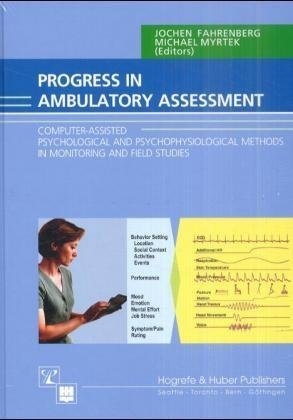
Progress in Ambulatory Assessment
Hogrefe & Huber (Verlag)
978-0-88937-225-2 (ISBN)
- Titel ist leider vergriffen;
keine Neuauflage - Artikel merken
Ambulatory assessment - the acquisition of psychological and/or physiological data in a natural setting - is a field which, as this volume's title suggests, rapid progress is being made. With contributions from North America and Europe, the text explores in detail the use of computer-assisted methods in both research and applied settings. Innovative techniques and approaches are described, which go far beyond the simple use of portable computers for data collection: online analysis and feedback, real-time processing, electronic diaries, ambulatory psychological tests and physiological measurements, event-contingent applications and more are covered. In addition to describing techniques, the text also describes concrete applications (and presents some results) of a variety of methods in real-life occupational and clinical settings. Examples include patients with chronic pain, borderline personality disorder, high blood pressure, asthma, diabetes or hot flashes in the clinical area; and aviation, air traffic control, occupational stress and heart rate or blood pressure in the occupational area.
Part 1 Psychological assessment: computer assisted ambulatory performance tests in everyday situations - construction, evaluation and psychometric properties of a test battery measuring mental activation, Lothar Buse and Kurt Pawlik; simultaneous computer-assisted assessment of causal attribution and social coping in families, Meinrad Perrez, Peter Wilhelm and Monique Horner; psychological monitoring in sociodiagnostics, Urs Baumann, Ludwig Feichtinger and Claudia Thiele; electronic momentary assessment - real-world, real-time measurement of patient experience, Michael R. Hufford, Saul Shiffman et al; psychological assessment in everyday life by hand-held PC -applications of MONITOR, Jochen Fahrenberg, Paul Huttner and Rainer Leonhart; does the retrospection effect hold as a stable phenomenon? First results from a transcultural self-monitoring study of mood in Brazil and Germany, Christoph Kappler and Stephan Rieder; ambulatory monitoring of diurnal changes in pain in chronic pain disorder, migraine and rheumatoid arthritis, Guido Godaert, Marjolin Sorbi et al; development and user's acceptance of the general electronic psychotherapy diary, Michael Hinkel and O. Berndt Scholz; states of aversive tension in patients with borderline personality disorder - a controlled field study, Christian Stiglmayr, Tanja Grathwol and Martin Bohus; daily mood reports in hindsight - results of a computer-assisted time sampling study, Petra Hank, Peter Schwenkmezger and Jens Schumann; time series analysis of diary data, Ralf Ott and O. Berndt Scholz; a multi-level approach to analyze ambulatory assessment data -an examination of family members' emotional states in daily life, Peter Wilhelm. Part 2 Psychophysiological assessment: posture and motion analysis by ambulatory accelerometry, Johannes B.J. Bussmann, Hendrika J.G. van den Berg-Emons and Henk J. Stam; accelerometry in clinical psychophysiology, Joke Tulen, Anita Volkers et al; assessment of posture, motion, and hand tremor by calibrated accelerometry, Friedrich Foerster; ambulatory monitoring of blood pressure in daily life - a tool for investigating psychosocial process, Andrew Steptoe; the assessment of blood pressure variability in behaviour modification - the identification of relevant situation and mood factors, Lutz Mussgay, Frithjof Niegot and Heinz Ruddel; ambulatory 24-hour monitoring of brachial and finger blood pressure in normotensive and hypertensive males, Reingard Seibt, Andre Berndt et al. (Part contents)
| Zusatzinfo | 96 figures, 85 tables, index |
|---|---|
| Verlagsort | Toronto |
| Sprache | englisch |
| Maße | 170 x 240 mm |
| Einbandart | gebunden |
| Themenwelt | Geisteswissenschaften ► Psychologie ► Test in der Psychologie |
| Mathematik / Informatik ► Informatik ► Theorie / Studium | |
| Medizin / Pharmazie ► Medizinische Fachgebiete | |
| Studium ► 1. Studienabschnitt (Vorklinik) ► Physiologie | |
| ISBN-10 | 0-88937-225-X / 088937225X |
| ISBN-13 | 978-0-88937-225-2 / 9780889372252 |
| Zustand | Neuware |
| Informationen gemäß Produktsicherheitsverordnung (GPSR) | |
| Haben Sie eine Frage zum Produkt? |
aus dem Bereich


